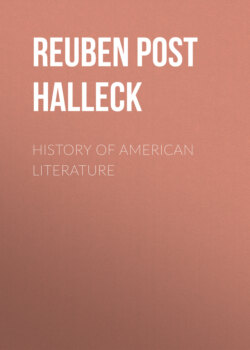Читать книгу History of American Literature - Reuben Post Halleck - Страница 12
На сайте Литреса книга снята с продажи.
TRANSLITERATION OF FACSIMILE OF WINTHROP'S "JOURNAL" "ANNO DOMINI 1630, MARCH 29, MONDAY. "EASTER MONDAY.
Оглавление"Riding at the Cowes, near the Isle of Wight, in the Arbella, a ship of 350 tons, whereof Capt. Peter Milborne was master, being manned with 52 seamen, and 28 pieces of ordnance, (the wind coming to the N. by W. the evening before,) in the morning there came aboard us Mr. Cradock, the late governor, and the masters of his 2 ships, Capt. John Lowe, master of the Ambrose, and Mr. Nicholas Hurlston, master of the Jewel, and Mr. Thomas Beecher, master of the Talbot."
The entry for Monday, April 12, 1630, is:—
"The wind more large to the N. a stiff gale, with fair weather. In the afternoon less wind, and our people began to grow well again. Our children and others, that were sick and lay groaning in the cabins, we fetched out, and having stretched a rope from the steerage to the main-mast, we made them stand, some of one side and some of the other, and sway it up and down till they were warm, and by this means they soon grew well and merry."
The following entry for June 5, 1644, reflects an interesting side light on the government of Harvard, our first American college:—
"Two of our ministers' sons, being students in the college, robbed two dwelling houses in the night of some fifteen pounds. Being found out, they were ordered by the governors of the college to be there whipped, which was performed by the president himself—yet they were about twenty years of age; and after they were brought into the court and ordered to twofold satisfaction, or to serve so long for it. We had yet no particular punishment for burglary."
Another entry for 1644 tells of one William Franklin, condemned for causing the death of his apprentice:—
"The case was this. He had taken to apprentice one Nathaniel Sewell, one of those children sent over the last year for the country; the boy had the scurvy and was withal very noisome, and otherwise ill disposed. His master used him with continual rigour and unmerciful correction, and exposed him many times to much cold and wet in the winter season, and used divers acts of rigour towards him, as hanging him in the chimney, etc., and the boy being very poor and weak, he tied him upon an horse and so brought him (sometimes sitting and sometimes hanging down) to Boston, being five miles off, to the magistrates, and by the way the boy calling much for water, would give him none, though he came close by it, so as the boy was near dead when he came to Boston, and died within a few hours after."
Winthrop relates how Franklin appealed the case when he was found guilty, and how the Puritans inflicted the death penalty on him after searching the Bible for a rule on which to base their decision. The most noticeable qualities of this terrible story are its simplicity, its repression, its lack of striving after effect. Winthrop, Bradford, and Bunyan had learned from the 1611 version of the Bible to be content to present any situation as simply as possible and to rely on the facts themselves to secure the effect.
Winthrop's finest piece of prose, Concerning Liberty, appears in an entry for the year 1645. He defines liberty as the power "to do that which is good, just, and honest. This liberty you are to stand for, with the hazard, not only of your goods, but of your lives, if need be." Winthrop saw clearly what many since his day have failed to see, that a government conducted by the people could not endure, if liberty meant more than this.
Winthrop's Journal records almost anything which seemed important to the colonists. Thus, he tells about storms, fires, peculiar deaths of animals, crimes, trials, Indians, labor troubles, arrival of ships, trading expeditions, troubles with England about the charter, politics, church matters, events that would point a moral, like the selfish refusal of the authorities to loan a quantity of gunpowder to the Plymouth colony and the subsequent destruction of that same powder by an explosion, or the drowning of a child in the well while the parents were visiting on Sunday. In short, this Journal gives valuable information about the civil, religious, and domestic life of the early days of the Massachusetts Bay Colony. The art of modern prose writing was known neither in England nor in America in Winthrop's time. The wonder is that he told the story of this colony in such good form and that he still holds the interest of the reader so well.
